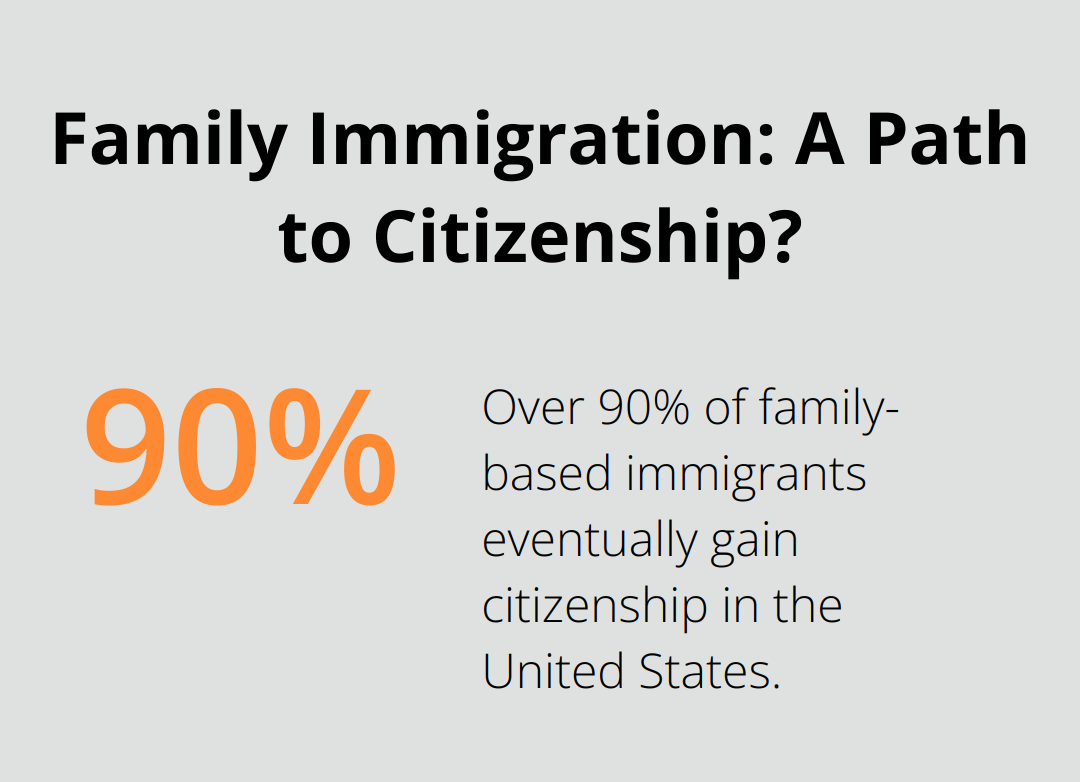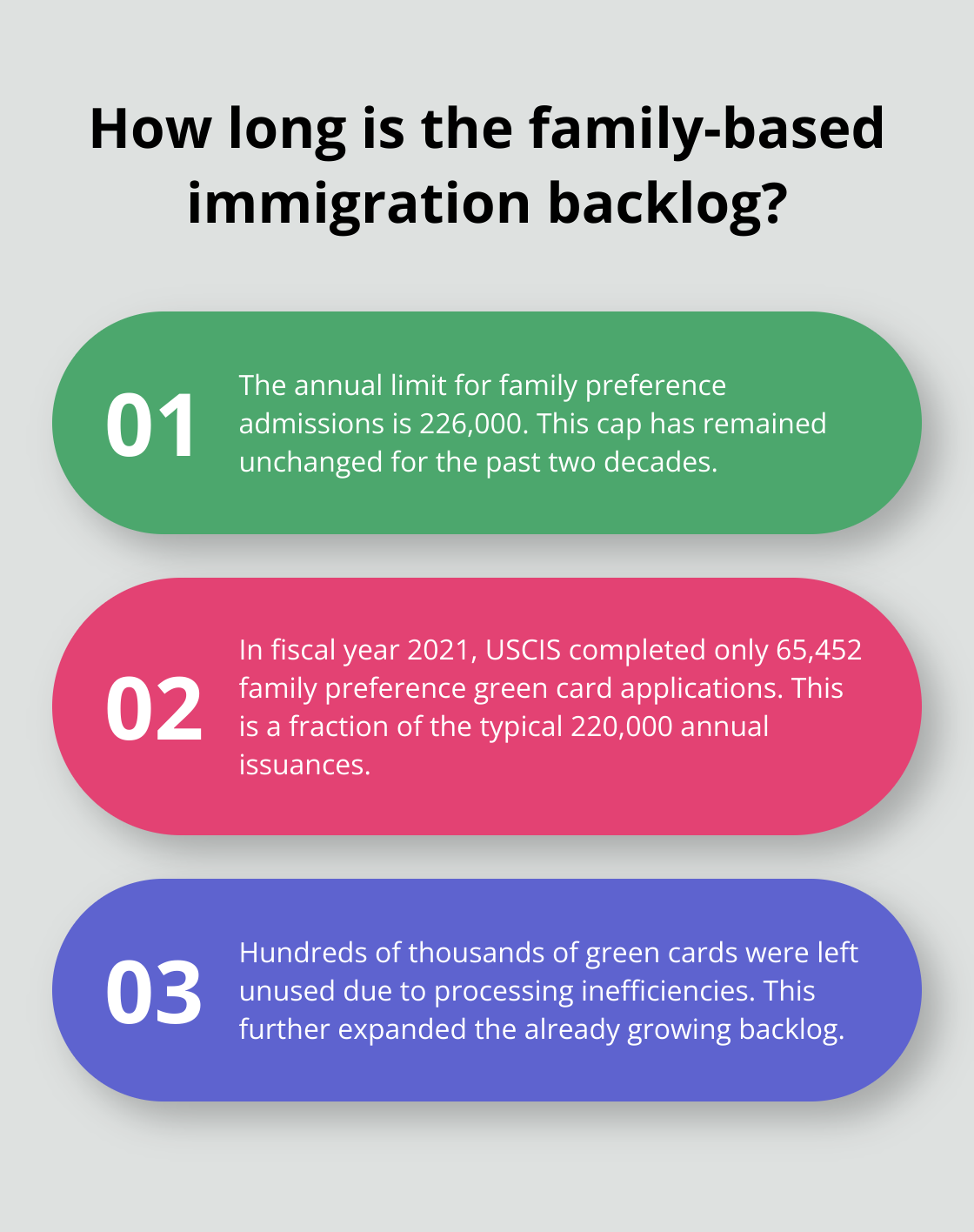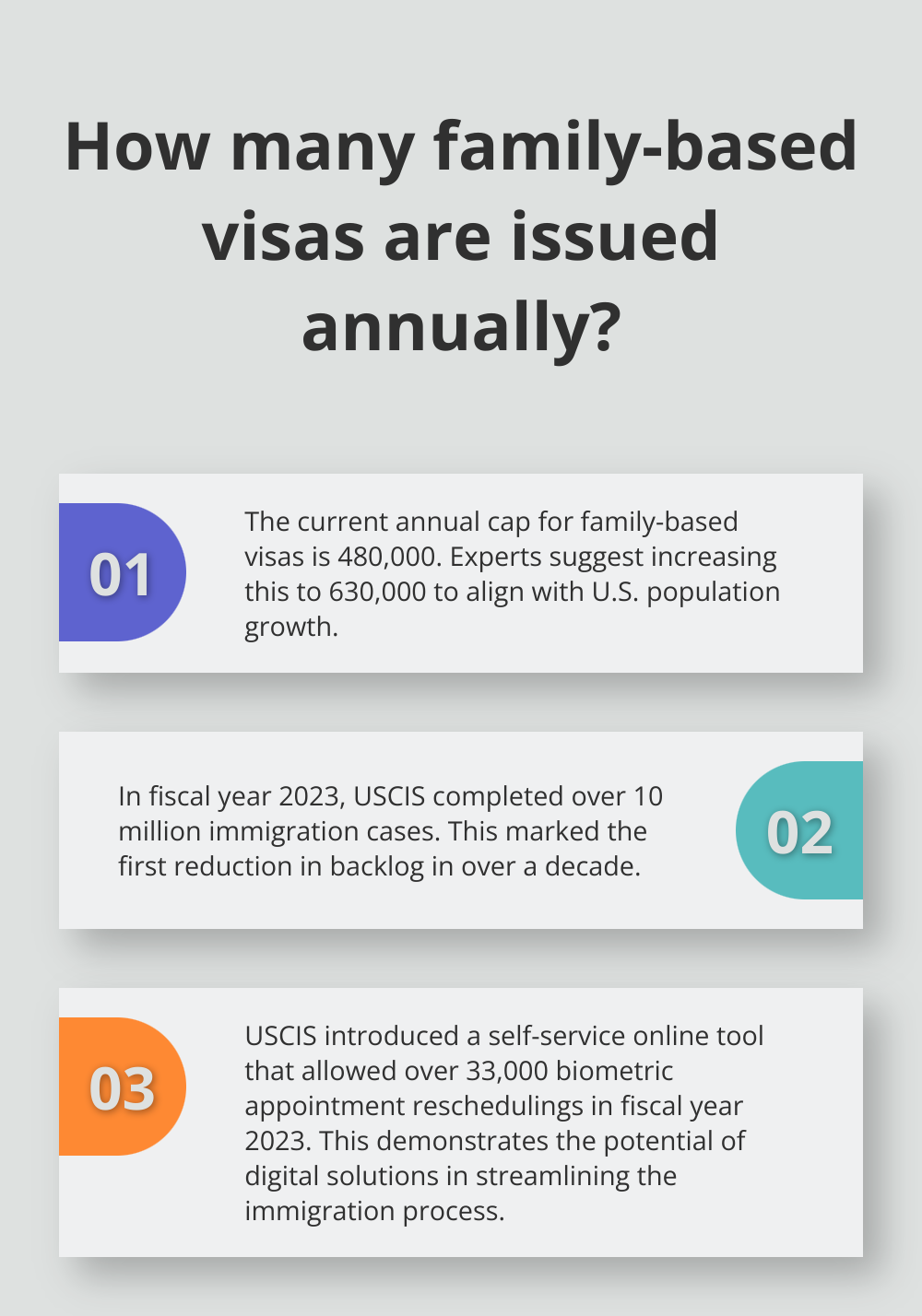
Family-Based Immigration Backlog: Reform Proposals
The family-based immigration backlog has reached critical levels, affecting millions of families seeking reunification in the United States. At Law Offices of Jeffrey A. Thompson, we’ve witnessed firsthand the emotional and economic toll this backlog takes on our clients and their loved ones.
Immigration reform to address the family-based backlog is urgently needed to alleviate the strain on families and communities. This post examines the current state of the backlog, its root causes, and proposed solutions to streamline the process and reunite families more efficiently.
Family-Based Immigration Backlog Explained
Current State of Family-Based Immigration
The United States faces a significant challenge in its family-based immigration system. USCIS provides data on various aspects of their operations, including information related to family-based immigration backlogs. This highlights the scale of the issue and its impact on families seeking reunification.
Categories and Wait Times
Family-based immigration consists of several preference categories, each with annual visa limits. The F3 preference category (for married adult children of U.S. citizens) experiences significant delays. Wait times for all preference immigrants increased from about 2 years and 10 months in 1991 to about 5 years and 8 months in 2018 – a 97% increase.
Processing Challenges and Backlogs
The COVID-19 pandemic worsened existing backlogs, causing significant delays in processing family-based immigration applications. Fiscal year 2021 saw only 65,452 family preference green cards issued, a sharp decrease from the typical 220,000 annual issuances. This reduction left hundreds of thousands of green cards unused, further expanding the backlog.
Impact on Families and Communities
These backlogs result in prolonged family separations, often lasting years or decades. Such separations cause emotional distress, financial hardship, and difficulties in future planning. The broader community also suffers, as the backlog delays the integration of immigrants who could contribute to the local economy and social fabric.
Economic Implications
The family-based immigration backlog carries significant economic consequences. Family-based immigrants often integrate well into American society, with over 90% eventually gaining citizenship. They frequently become entrepreneurs, join the workforce, and play vital roles in community development. The current backlog effectively postpones these positive economic contributions.

Addressing this backlog requires more than just reuniting families; it involves strengthening our communities and economy. As we move forward, we must consider the factors that contribute to this growing problem and explore potential solutions to create a more efficient and humane immigration system.
Why the Family-Based Immigration Backlog Continues to Grow
The family-based immigration backlog in the United States expands, causing significant challenges for families seeking reunification. Several key factors contribute to this growing problem, each compounding the difficulties faced by immigrants and their loved ones.
Visa Cap Limitations
One of the primary reasons for the backlog is the strict annual limits on family-based visas. The Immigration and Nationality Act of 1965 established these caps, which have remained largely unchanged despite significant population growth and increased demand. The annual limit for family preference admissions has remained fixed at 226,000 for the past two decades. This static cap fails to account for the evolving needs of immigrant families and the growing U.S. population.
Processing Inefficiencies
Inefficient processing systems worsen the backlog issue. The U.S. Citizenship and Immigration Services (USCIS) faces challenges in managing the high volume of applications with outdated technologies and procedures. In fiscal year 2021, USCIS completed only 65,452 family preference green card applications (a fraction of the typical 220,000 annual issuances). This dramatic decrease left hundreds of thousands of green cards unused, further expanding the backlog.
Increasing Demand
The demand for family-based visas has surged in recent years, outpacing the available supply. This increased demand stems from various factors, including global demographic shifts, economic conditions, and geopolitical events.
Policy Fluctuations
Political shifts and policy changes have significantly impacted the family-based immigration process. Recent administrations have implemented various measures that have affected processing times and eligibility criteria. For instance, changes to the public charge rule and increased scrutiny of applications have led to longer processing times and higher denial rates. These policy fluctuations create uncertainty and further complicate an already complex system.

The growing backlog not only separates loved ones but also delays the economic and social contributions that immigrants bring to our communities. Addressing these underlying issues is essential for creating a more efficient and humane immigration system that truly serves the needs of families and the nation as a whole. As we examine the factors contributing to this backlog, it becomes clear that comprehensive reforms are necessary to address these systemic challenges.
How Can We Reform Family-Based Immigration?
The family-based immigration system in the United States needs significant reforms to address the growing backlog and reunite families more efficiently. We believe that implementing these changes will create a fair and effective immigration process.
Expand Visa Availability
One of the most impactful reforms would increase the annual caps on family-based visas. The current limit of 480,000 visas per year has remained unchanged for decades, despite population growth and increased demand. Experts suggest that aligning the cap with U.S. population growth could potentially increase available visas to 630,000 annually (a substantial increase that would significantly reduce wait times and allow more families to reunite sooner).
Modernize the Application Process
USCIS has made strides in digitizing its operations, but further technological advancements are necessary. A fully digital application system would streamline the process, reduce paperwork errors, and speed up processing times. In fiscal year 2023, USCIS introduced a self-service online tool that allowed over 33,000 biometric appointment reschedulings. This demonstrates the potential of digital solutions. The expansion of such initiatives across all application types could dramatically improve efficiency.
Address Administrative Bottlenecks
Administrative inefficiencies contribute significantly to the backlog. USCIS should focus on hiring and training additional staff to handle the high volume of applications. In fiscal year 2023, USCIS completed over 10 million immigration cases, marking the first reduction in backlog in over a decade. This progress shows that targeted efforts can yield results. Additionally, the implementation of more efficient case management systems and prioritization of cases based on clear criteria could help reduce processing times across all categories.
Propose Legislative Solutions
Congressional action is essential for comprehensive reform. Proposed legislation, such as the EAGLE Act, aims to eliminate discriminatory per-country caps that extend wait times for certain immigrants. Another potential solution involves the recapture of unused green cards from previous years. The demand for employment-based green cards far exceeds the annual statutory allotment, resulting in a sizeable employment-based queue of foreign nationals awaiting permanent residence.
Enhance Economic Contributions
These reforms would not only benefit individual families but also contribute to the broader U.S. economy and society. Family-based immigrants often become entrepreneurs, join the workforce, and play vital roles in community development. The implementation of these changes can create a more efficient, fair, and humane immigration system that truly serves the needs of families and the nation as a whole.

Final Thoughts
The family-based immigration backlog has reached critical levels, causing prolonged separations and economic hardships for countless families. This issue affects individual families and has far-reaching consequences for our communities and economy. The current system, with outdated visa caps and inefficient processes, cannot handle the growing demand for family reunification.

Immigration reform for the family-based backlog requires comprehensive action focused on expanding visa availability and modernizing application processes. Legislative action must eliminate per-country caps and recapture unused green cards from previous years. These reforms will reunite families more quickly and enhance the economic and social contributions of immigrants to our nation.
At Law Offices of Jeffrey A. Thompson, we commit to guiding families through the complexities of the current immigration system. We provide expert assistance in navigating the process, from paperwork to overcoming legal hurdles (helping our clients achieve their American dreams). As we advocate for reform, we continue to offer compassionate and knowledgeable representation to those affected by the family-based immigration backlog.


